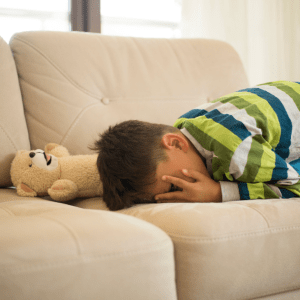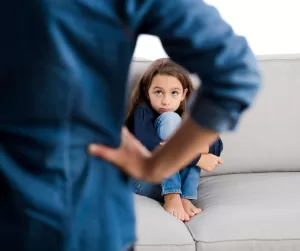
How do you think your kids experience you? Do they expect loving, positive attention and trust or criticism and judgement? Or no attention at all until they cause a problem? Watch yourself and see what they respond to.
Whenever you yell, threaten, punish, or use that blaming tone that turns your child “parent deaf”, you are teaching your children that they are a problem—because you see them as a problem. What you want is the problem to end, but what you are focusing on—what your child is doing wrong—makes the problem worse.
What you want to grow is your child’s capability.
So trust your child’s capability to overcome problems. This requires a mindset shift and understanding what trust really means. Your trust is needed 24/7, especially if your child is behaving in untrustworthy ways.
It’s not about trusting behavior or even your child’s current motivations. It’s about trusting who your child is and that he wants to do things right. The fact that things are going wrong can be corrected by your change in focus.








 As far as I can tell, most parents want their children to reach launch-age fully capable of conducting their lives with responsibility and respect. When they leave the safety of their nests with self-confidence, feeling competent and resilient, with the drive to contribute positively to the world, they are ready to greet whatever comes at them. We want our children to go out into the world capable of finding success yet able to weather the bumps and storms with a strong sense of self.
As far as I can tell, most parents want their children to reach launch-age fully capable of conducting their lives with responsibility and respect. When they leave the safety of their nests with self-confidence, feeling competent and resilient, with the drive to contribute positively to the world, they are ready to greet whatever comes at them. We want our children to go out into the world capable of finding success yet able to weather the bumps and storms with a strong sense of self.
 As far as I can tell, most parents want to raise successful children to reach launch-age fully capable of conducting their lives with responsibility and respect. When they leave the safety of their nests feeling self-confident, competent, resilient, and have the drive to contribute positively to the world, they are ready to greet whatever comes at them. We want our children to go out into the world capable of finding success yet able to weather the bumps and storms with a strong sense of self. But, what are the secrets that make children successful?
As far as I can tell, most parents want to raise successful children to reach launch-age fully capable of conducting their lives with responsibility and respect. When they leave the safety of their nests feeling self-confident, competent, resilient, and have the drive to contribute positively to the world, they are ready to greet whatever comes at them. We want our children to go out into the world capable of finding success yet able to weather the bumps and storms with a strong sense of self. But, what are the secrets that make children successful? Q. I have two daughters, 12 and 10. We have a wonderful, respectful, open relationship. The older is very much an introvert, like me and my husband. She works hard academically, achieves well, and has a mind that races along a million miles per hour. She is always up to something constructive, is very comfortable in her own company.
Q. I have two daughters, 12 and 10. We have a wonderful, respectful, open relationship. The older is very much an introvert, like me and my husband. She works hard academically, achieves well, and has a mind that races along a million miles per hour. She is always up to something constructive, is very comfortable in her own company.  It’s Okay to Let Kids Quit Things
It’s Okay to Let Kids Quit Things The family is a nurturing ground, not a training ground. When I hear parents say, “My job is to prepare him to deal with the real world. People out there aren’t going to care how he feels about what he has to do,” I hear a justification for traditional, authoritarian parenting, and I want to counter it to expose the moving parts.
The family is a nurturing ground, not a training ground. When I hear parents say, “My job is to prepare him to deal with the real world. People out there aren’t going to care how he feels about what he has to do,” I hear a justification for traditional, authoritarian parenting, and I want to counter it to expose the moving parts.
 It’s really easy to get down on yourself for behaving regretfully toward your child. What’s hard is forgiving yourself because you’re human and making amends.
It’s really easy to get down on yourself for behaving regretfully toward your child. What’s hard is forgiving yourself because you’re human and making amends.  Vulnerability does not equal weakness. Vulnerability
Vulnerability does not equal weakness. Vulnerability 
